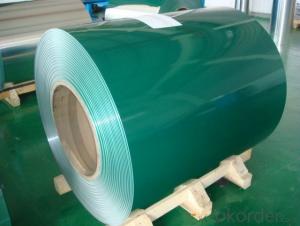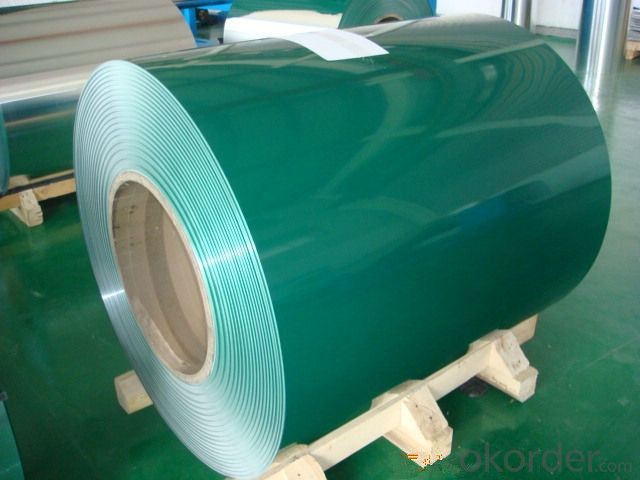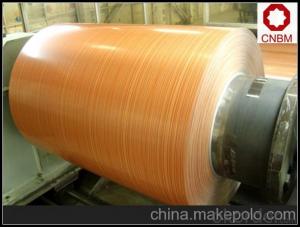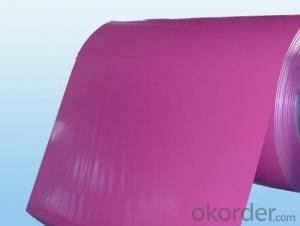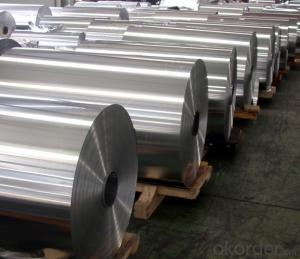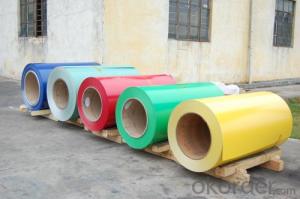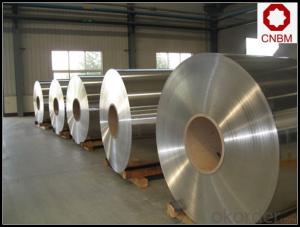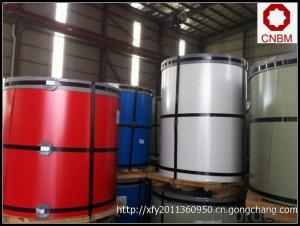3105 Prepainted Aluminum Coil for Elevator Decoration
- Loading Port:
- Shanghai
- Payment Terms:
- TT OR LC
- Min Order Qty:
- 3 m.t.
- Supply Capability:
- 60000 m.t./month
OKorder Service Pledge
OKorder Financial Service
You Might Also Like
Specification
Color Coated Aluminium Roll For Elevator Decoration
Specifications
Alloy | 1060, 1100, 3003, 8011, etc. |
Temper | H16, H18, H24, H26, H28 |
Thickness | From 0.05mm to 3.0mm |
Width | Standard width:1240mm |
Special width:1300mm, 1520mm, 1570mm, 1595mm | |
Diameter | Standard dia:1200mm |
Interior dia:150mm,405mm,505mm | |
Weight | 2.5 T/coil,3.0 T/coil |
Coating | PE, PVDF, ACRYLIC |
Surface | Embossed, mill finish, coated |
Color | AS to code RAL |
Gloss | 10-90%(EN ISO-2813:1994) |
Coating Thickness | PE: more than 18 micron |
PVDF: more than 25 micron | |
Coating Hardness(pencil resistance) | More than 2h |
Coating adhesion | 5J (EN ISO-2409:1994) |
Impact Resistance | No peeling or cracking(50 kg/cm,ASTMD-2794:1993) |
Flexibility(T-bend) | 2T |
MEK resistance | More than 100 |
Advantage | 1.High temperature resistant 2.Weathering resistant 3.Scrubbing resistant 5.Acid or alkali proof 6. Fireproof 7.Light weight material is easy to construct and install |
Out package | Wooden splint with export standard |
Application | ACP, wall cladding, facades, roofs and canopies, ceilings, signboards, blind window, display platforms, electrical panels, etc |
Characteristics
1) Excellent weather-proof durability
2) Anti-ultraviolet
3) High erosion resistance
4) Stable color and gloss
5) Good mechanical processing performance
6) Abrasion resistance
7) Anti-impact
8) High flexibility
Application
1) Construction material further processing
2) Solar cell frame, solar battery frame
3) Glass curtain wall frame
4) Interior decoration
5) Elevator decoration
6) Signs, nameplate, bags making.
7) Automobile parts material
8) Office and Household appliances: HVAC equipments
9) The consumer electronics: mobile phones, digital cameras, MP3 .etc.
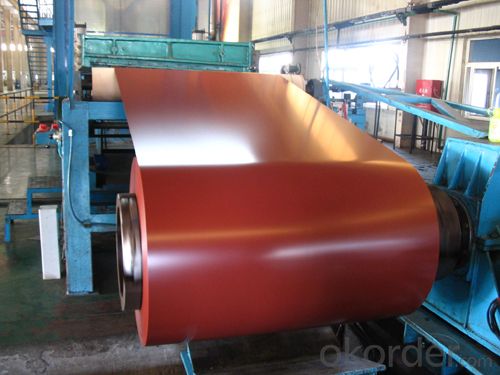
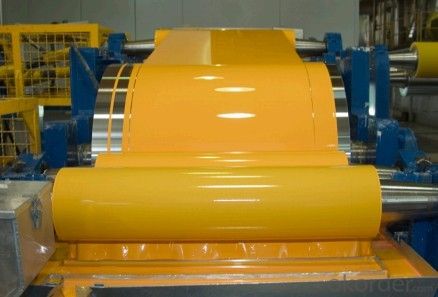
Coating varieties
Polyester Coatings (PE)
PE (polyester) coatings exhibit an excellent combination of hardness, flexibility, flow, appearance, and superior resistance to dirt retention in indoor and outdoor applications. These coatings are highly resistant to abrasion, metal marking, staining, and marring, and require minimal maintenance. Glazetech uses polyester paints which provide excellent colour and gloss retention properties.
Polyvinylidene Fluoride Coatings (PVDF)
PVDF (polyvinylidene fluoride) is a chemical resistant thick film barrier coating commonly used in architectural applications where both excellent appearance and substrate protection must be maintained over a long period of time. This coating is unaffected by most chemicals and solvents and has excellent wear and abrasion resistance. PVDF also has a high dielectric strength, excellent resistance to weathering and the ability to self extinguish.
FAQ
--Q: Do you provide free samples?
--A: Yes, free samples will be sent to you on freight at destination.
--Q: Can I get your latest products catalogue?
--A: Yes, it will be sent to you in no time.
--Q: What is the MOQ?
--A: 2 tons
--Q: What are your payment terms?
--A: We accept L/C, T/T.
--Q: What kinds of alloy can you supply?
--A: 1000 series: 1050, 1060, 1070, 1100, 1145, 1200
3000 series: 3003, 3004, 3105, 3104
5000 series: 5052, 5083, 5754, 5182
6000 series: 6061, 6063, 6062, 6063
8000 series: 8011, 8021
--Q: What’s the coating of top side?
--A: PVDF and PE coating
--Q: What kinds of temper can you supply?
--A: O-H112: O,H12,H14,H16,H18,H22,H24,H26,H,32,H34,H111,H112, T3, T4, T6
- Q: Can aluminum coils be utilized to create jewelry boxes and other decorative objects?
- <p>Yes, aluminum coils can be used to make jewelry boxes and other decorative items. Aluminum is lightweight, durable, and has a shiny finish that can add a touch of elegance to decorative pieces. It can be easily shaped and manipulated using various tools and techniques, such as bending, cutting, and engraving. Additionally, aluminum's resistance to corrosion makes it a practical choice for long-lasting decorative items. However, it's important to consider that working with aluminum may require specific skills and tools, and the final appearance can be influenced by the quality of the aluminum and the craftsmanship involved.</p>
- Q: How are aluminum coils protected against scratching and abrasion?
- Various methods and coatings are utilized to protect aluminum coils from scratching and abrasion. One commonly employed technique involves applying a protective film or coating to the coils' surface. This film acts as a barrier, shielding the aluminum from external forces that may lead to scratching or abrasion. In addition, aluminum coils can undergo an electrochemical process called anodizing, which generates a protective layer on the aluminum's surface. This layer not only increases the coil's resistance to scratching and abrasion but also enhances its durability and corrosion resistance. Protective lacquer or paint can also be applied to aluminum coils to safeguard them. This coating not only enhances the coils' visual appearance but also acts as a barrier against potential scratches or abrasion. These protective coatings can be customized to meet specific requirements, such as UV resistance or chemical resistance. Furthermore, aluminum coils can be manufactured with a textured or patterned surface, which creates a more robust surface that is less susceptible to scratching or abrasion. The texture helps distribute external forces more evenly, reducing the chances of damage. Overall, a combination of protective films, anodizing, protective coatings, and textured surfaces is employed to ensure the longevity and performance of aluminum coils in various applications while safeguarding them against scratching and abrasion.
- Q: What are the bending and forming capabilities of aluminum coils?
- Aluminum coils have excellent bending and forming capabilities due to the inherent properties of aluminum as a malleable and ductile material. Aluminum is known for its high strength-to-weight ratio, which allows it to be easily shaped and formed without compromising its structural integrity. When it comes to bending, aluminum coils can be bent into various shapes and angles without fracturing or cracking. The flexibility of aluminum allows it to be formed into tight curves or gentle bends, making it suitable for a wide range of applications. This flexibility is particularly advantageous in industries such as construction, automotive, and aerospace, where curved or complex shapes are often required. In terms of forming, aluminum coils can be easily manipulated into different forms, including flat sheets, tubes, or intricate profiles. This versatility makes aluminum coils highly sought after in industries where customization and design flexibility are important. Furthermore, aluminum coils can undergo various forming processes such as roll forming, stamping, and deep drawing, allowing them to be transformed into different products with precise dimensions and tolerances. These forming capabilities make aluminum coils a preferred choice for manufacturing components, such as automotive body panels, roofing materials, heat exchangers, and structural elements. Overall, the bending and forming capabilities of aluminum coils are exceptional, making them an ideal choice for applications that require flexibility, durability, and design versatility.
- Q: What are the different tempers available for aluminum coils?
- The different tempers available for aluminum coils include annealed, full hard, half hard, and quarter hard.
- Q: Are aluminum coils suitable for use in the automotive industry and what are their applications?
- <p>Yes, aluminum coils are widely used in the automotive industry due to their lightweight, high strength, and corrosion resistance. They are utilized in various applications including vehicle body panels, engine components, heat exchangers, and electrical wiring. Aluminum's recyclability and energy efficiency also contribute to its popularity in automotive manufacturing, helping to reduce vehicle weight and improve fuel efficiency while adhering to environmental standards.</p>
- Q: What are the different types of protective coatings for aluminum coils?
- Aluminum coils can benefit from various protective coatings to boost their durability and lifespan while safeguarding against environmental elements. 1. Polyester Coatings: With their exceptional UV ray and weather resistance, polyester coatings are widely utilized for aluminum coils. They offer vibrant color retention and a broad spectrum of color options, making them ideal for applications where aesthetics matter, such as in architecture. 2. Polyvinylidene Fluoride (PVDF) Coatings: Renowned for their exceptional resistance against fading, chalking, and chemical exposure, PVDF coatings are suitable for harsh environments. They exhibit high weatherability and can withstand extreme temperatures, making them commonly used in industrial and commercial settings. 3. Epoxy Coatings: Epoxy coatings present robust adhesion and excellent corrosion resistance. They act as a protective barrier against moisture and chemicals, making them well-suited for applications where the coils may encounter harsh conditions, particularly in marine and industrial settings. 4. Acrylic Coatings: Acrylic coatings offer good adhesion and flexibility. They provide moderate weather resistance and can be easily applied and repaired. Acrylic coatings find applications in various sectors, including automotive and general industrial uses. 5. Polyurethane Coatings: Polyurethane coatings showcase outstanding resistance to abrasion, chemicals, and weathering. They offer exceptional durability and are commonly employed in demanding applications where the coils may face harsh conditions or heavy wear. 6. Silicone Coatings: Silicone coatings boast remarkable resistance to extreme temperatures and UV exposure. They exhibit excellent weatherability and can endure prolonged exposure to sunlight without degradation. Silicone coatings are frequently utilized in automotive parts and outdoor equipment. The selection of the appropriate protective coating should be based on the specific requirements of the aluminum coils and the intended application. Factors to consider include the desired level of protection, appearance, and the environmental conditions to which the coils will be exposed.
- Q: A piece of aluminum foil 0.550 mm thick and 1.00 cm square is allowed to react with bromine to form aluminum bromide?a) How many mole of aluminum were used? ( The density of aluminum is 2.699 g/cm3.)I keep getting the same answer which I know is wrong. I used a formula to get the volume and then the mass to get the moles, but maybe this is wrong. Could someone explain the process. I got 4.32 x 10-1 mol Al, but the answer is 5.50 x 10-3 mol Al.
- volume= 0.0550 cm x 1.00 cm^2= 0.0550 cm^3 gms Al= 2.699 g/cc x [vol] 0.0550 cc = 0.148 g moles Al = [grams]/[mole wt] mol wt=26.98 so 2.699[g/cc] x 0.0550[cc] / 26.98 =0.00550 or 5.50x 10^-3 to 3 sig fig units cancel and gram-moles is final unit.
- Q: I heared the aluminum weakens or melts.
- Mercury readily combines with aluminium to form a mercury-aluminum amalgam when the two pure metals come into contact. However, when the amalgam is exposed to air, the aluminium oxidizes, leaving behind mercury. The oxide flakes away, exposing more mercury amalgam, which repeats the process. This process continues until the supply of amalgam is exhausted, and since it releases mercury, a small amount of mercury can “eat through” a large amount of aluminium over time, by progressively forming amalgam and relinquishing the aluminium as oxide. Aluminium in air is normally protected by a thin layer of its own oxide, which is not porous to mercury. Mercury coming into contact with this oxide does no harm. However, if any elemental aluminium is exposed (even by a recent scratch), the mercury may combine with it, starting the process described above, and potentially damaging a large part of the aluminium before it finally ends.
- Q: This question asks for the current prices of aluminum coils, which may vary based on factors such as weight, thickness, and market conditions.
- <p>The prices of aluminum coils can vary significantly depending on several factors including weight, thickness, grade, and market demand. Prices are also influenced by global economic conditions and the current state of the commodities market. As of my last update, aluminum coil prices could range from a few dollars to several hundred dollars per pound, but for the most accurate and up-to-date pricing, it's best to check with a supplier or a commodities exchange, as these prices fluctuate regularly.</p>
- Q: How do aluminum coils contribute to the electrical conductivity of products?
- Aluminum coils are widely used in electrical applications due to their excellent conductivity properties. The electrical conductivity of aluminum is high, making it an ideal material for transmitting and distributing electrical power. When aluminum coils are used in products, they facilitate the flow of electric current. Aluminum has a low resistance to the flow of electricity, allowing for efficient transmission of electrical energy. This low resistance ensures minimal power loss during transmission, which is critical in maintaining the efficiency of electrical systems. Additionally, aluminum coils have a high thermal conductivity, allowing them to quickly dissipate heat generated during the transmission of electrical current. This is crucial in preventing overheating and maintaining the stability and longevity of electrical products. The lightweight nature of aluminum also contributes to its suitability in electrical applications. Its low density makes it easier to handle and install, reducing the overall weight of products and making them more portable. Overall, aluminum coils play a significant role in enhancing the electrical conductivity of products. Their high conductivity, low resistance, and excellent thermal properties make them a preferred choice in a wide range of electrical applications, including power transmission lines, electrical cables, motors, transformers, and other electrical devices.
Send your message to us
3105 Prepainted Aluminum Coil for Elevator Decoration
- Loading Port:
- Shanghai
- Payment Terms:
- TT OR LC
- Min Order Qty:
- 3 m.t.
- Supply Capability:
- 60000 m.t./month
OKorder Service Pledge
OKorder Financial Service
Similar products
Hot products
Hot Searches
Related keywords
